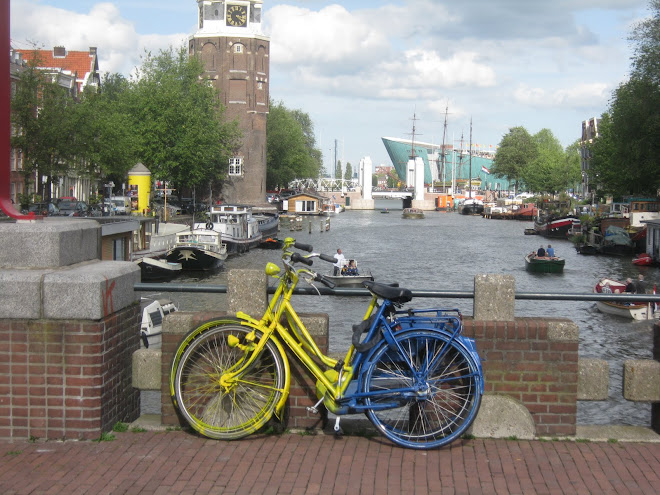I can't believe this is not a word. I can't find it in any dictionaries. Well, if nobody objects, I'd like to coin the term
hy·per·for·eign·a·tion [hahy-per-fawr-in-ney-shuhn]
hy·per·for·eign·a·tion [hahy-per-fawr-in-ney-shuhn]
-noun
1. Overemphasis in attempt to correctly pronounce word or phrase foreign to the speaker, resulting in unnecessarily incorrect pronunciation, especially when speaker's native linguistic inclinations, when followed, would have resulted in correct or more correct pronunciation.
Everyone who has ever learned a new language has probably hyperforeignated at some point. Take for example the subconscious German reaction to the letters W and V, as they are pronounced in the English alphabet. The letters W and V enjoy nearly identical pronunciation in the German language (both sound like an English V), but are markedly different in English. It seems like the first reaction by German speakers learning English is to pronounce all Ws like Vs ("You are velcome!") but then, upon realizing that W makes a "oua" sound in English, the tendency is often over-corrected. Suddenly, all would-be V-sounds are redirected into W-sounds. Sometimes this pattern is successful. Winter, Wein and Wilkommen, all pronounced with a V-sound, turn neatly into winter, wine and welcome. However, this pattern can't be applied to everything. Wodka, for example, is pronounced the same in English but spelled with a V. Same goes for sowjet (soviet). Soon, telewision, winigar, and wery begin to dot the linguistic landscape. The mind seems to go, "Look, here comes a V-sound, better pronounce it like a W!"
The same confusion surrounding W and V among German speakers seems to be experienced just as strongly by speakers of French with the English H. In French, the letter H, as in hôtel, hôpital and horreur, is silent. These words, translating neatly into hotel, hospital and horror, give the false impression that all words in which the first letter pronounced is a vowel also receive an aspirated H, which is why you'll hear things like holive oil and horange. The aspirated H does not exist in French, so it is odd to hear such a concentrated effort placed on aspirating an H which does not need to be there. Meanwhile, the H disappears mysteriously from the words hair, have, and he.
(This switcharound seems to plague Italian speakers as well; an Italian friend I knew in Switzerland used to go to town every week with her friends Ellen and Hamber, known to everyone else as Helen and Amber.)
English speakers, are, of course, not perfect either. In fact, as typical linguistic late-bloomers, English speakers may be some of the world's worst hyperforeignators. (Or best, depending on how you look at it.) In the non-English speaking world, polite overlookance of blatant hyperforeignation by English speakers as they attempt to master a foreign language is general, and all recognizable sounds (let alone entire sentence constructions) uttered in a foreign tongue are met with encouragement and praise.
Yet we're improving. Young Anglo-Saxons are a more-traveled, worldlier demographic than the generation preceding them. Younger and younger, they are tentatively dipping their toes into the shallow end of the Olympic-sized pool that is non-English-speaking world.
We are, however, in no way exempt of the hyperforeignation phenomenon. In German, I personally have even been guilty of over-umlauting on occasion. That is, once I discovered the power of the German umlaut (mäandern, Küche, Öffentlichkeit), I got a little overexcited and began putting umlauts where they didn't belong, saying I was going "einkäufen" or telling people about my "Kätze" at home. (What color? "Schwärz.")
One really shouldn't take those dots so lightly, I slowly discovered. After all, an innocent ü can mean the difference between gay and humid.
I still can't say ö, so mistakes in which I incorrectly employ that letter are only made in my mind.
I aired the idea of hyperforeignation at dinner last weekend in Leipzig with other Congress-Bundestag participants. Marcus said he once asked a guy in Switzerland if he had "Fenster" on his computer (Fenster meaning "window" in German).
The guy: "Fenster?"
Marcus: "You know, Microsoft Fenster."
(A moment of confusion for both parties, then clarity:)
"Ahhh, Vindows!"
Patrick then added that he had once referred to das Mutterbrett in the German workplace and was told, "We just say 'motherboard,' man."
So I suppose the definition could be expanded a bit to include:
2. The unnecessary translation of words or phrases out of one's mother tongue into a foreign language, when such terms would be better known when left in the speaker's mother tongue.
So there you have it. A new word. Fully defined and exemplified. What more could a linguaphile want?
So there you have it. A new word. Fully defined and exemplified. What more could a linguaphile want?















I LOVE it! I know I've done that in French before....when I think of some examples I'll come back to share :)
ReplyDelete